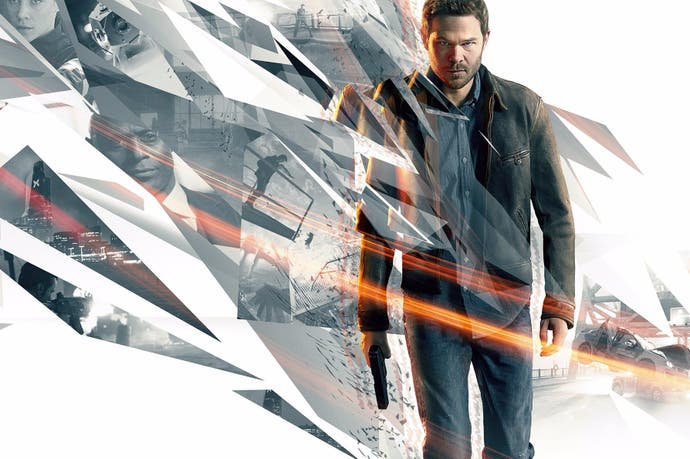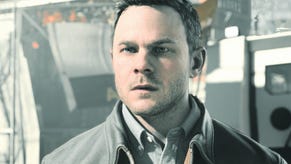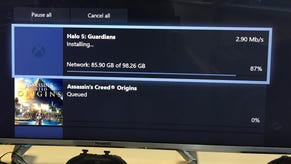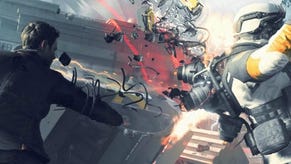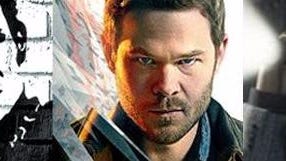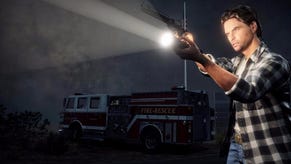Quantum Break review
Time out of joint.
Six years ago, Helsinki-based independent Remedy Entertainment came in for criticism that, with the long-awaited Alan Wake, it sometimes seemed more interested in making a film than it did a video game. Its follow-up feels like a typically Finnish stroke of dour, deadpan humour: with Xbox One and Windows exclusive Quantum Break, it's gone in wholeheartedly and made a full live-action movie.
Well, a television series to be more precise, and while the four 20-minute episodes that intersperse Quantum Break's five acts speak for only a portion of the 10-hour running time, they mark it out as something very different; an odd mongrel of a game that earnestly plays for the kind of cinematic single-player experience far removed from the current triple-A fashion of open-ended expanse. Perhaps it's a hangover of Microsoft's ill-fated grab for television, made infamous in the mantra that echoed awkwardly around the Xbox One's initial reveal and now, with the closure of Microsoft's TV studios, firmly abandoned.
In part Quantum Break feels like an artefact of a different age - an imposter from an aborted timeline, some chilling dystopia in which Don Mattrick was right all along and that forced smile never subsided - though there's a little more to it than that. Ever since the comic-book excess of Max Payne, Remedy's had an eye on playful cross-media, and Quantum Break sees the studio travel even further down that path. It's a natural extension of the studio's love of pulp of all flavours; whereas before it was comic book noir or American horror, Quantum Break is a celebration of television serials such as Orphan Black, Falling Skies and Sense8 that have proven so crushingly compelling in recent years. Remedy's particular brand is slick sci-fi that takes the faintly cerebral premise of time travel to conjure up entertainment that's wilfully, gleefully mindless.
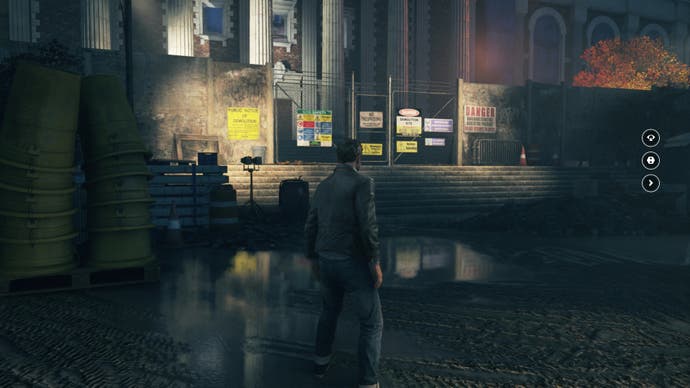
You're Jack Joyce, brother to gifted scientist William who's opened up a temporal fracture thanks to a small black hole in his local university, and one that threatens to bring about the end of time itself (as William says to Jack in one of the few moments of levity as part of a delightfully tortured analogy, "the time egg is f***ed"). Insert the blandly evil outfit Monarch Corporation and its villainous head Paul Serene, played with schlocky relish by Aidan Gillen, and you've got all the requisite threads for a happy tangle. It's enough to ensnare you effectively, even if there's not much room for logic or character in a plot that twists more frequently than Gillen's accent.
Each episode is professionally produced and competently scripted and acted - drafting in established talent such as Shawn Ashmore in the lead role, Dominic Monaghan as his brother William and Lance Reddick in an enjoyably aloof performance as corporate heel Martin Hatch all help elevate it above the sometimes awkward dramatics of Alan Wake - even if the taint of Microsoft endorsement in the lingering shots of Windows Phones can sometimes lend it the hollow aura of an extended commercial (in a surprising and more explicit fit of product placement, Quantum Break is a huge fan of Nissans, starring a 370Z in one early car chase and with a cityscape scarred by billboards for the things, while later a dramatic escape is undermined by the sight of our heroes using a Nissan Note to crash unconvincingly through a security barrier - perhaps Phil Spencer netted himself a cut-price Qashqai in helping broker the deal).
As a television show, Quantum Break works surprisingly well. It's heavy-handed in places - witness the self-centred hacker nerd that slowly learns humility to become a hero, or the hitman with a heart who's breaking necks for his pregnant wife at home - yet it's perfectly effective at pulling you along, a well-oiled machine for drama that effortlessly churns you in. It's not quite interactive fiction, despite its best intentions - unearthing certain objects in-game unlocks small, fairly inconsequential scenes in each episode, while there are brief interludes leading up to each live action section that afford you a critical choice in which you're offered a preview of the consequences. They're abstract and often without enough context to feel truly meaningful, however - and aside from dictating the fates of a handful of side characters, they have little bearing on the grand story arc.
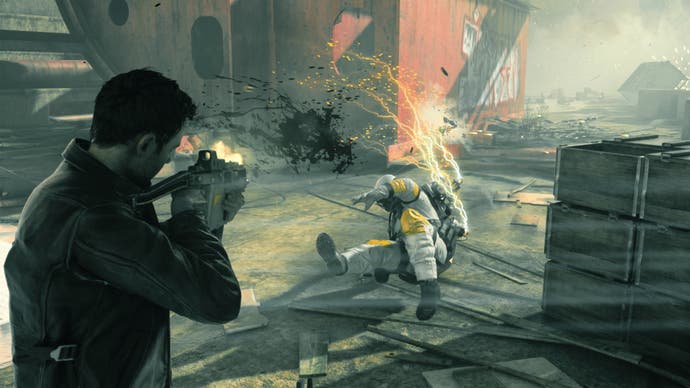
What's more impressive is how the game shares the look and feel of the TV series - the backdrop of Ridgeport, a fictional Northeastern US city of twee campuses and vast corporate buildings, is anonymous enough to make the jump untouched, while performances are well captured in-engine, even if sometimes the expressions contort and drip across faces in a way that inadvertently mimics the ketamine fog of all that distorted time - and shares its wilful simplicity too. Quantum Break is primarily a shooter with little depth or nuance. What it boasts instead is an impeccable sense of style.
Some of that drips into your time-warping abilities, unlocked in quick succession in the opening acts. You can burst across the screen and unlock a small window of slow-motion, a tricked-out evolution of Max Payne and Alan Wake's own dodge moves, or open up a small bubble that lets you stack up walls of live ammunition that are then unleashed to brutally impactful effect. Your abilities tied to quickly refilled cooldown counters in this refreshingly aggressive brand of gunplay, and you're gloriously overpowered. Rather than rein you in Remedy has great fun acknowledging that fact, especially towards Quantum Break's closing third in which you deal out death freely while enemies quiver at your very sight.
Quantum Break offers an empowering vocabulary, although an inability to infuse it with a sense of real purpose means it's a little garbled in its delivery. Ultimately, there's never quite enough to do with it all. Enemies come in too few flavours - shotgunners will rush you down while others will be wearing armour that saps through your abilities and are also capable of warping around the screen. The peak flair in Quantum Break's enemy design comes when you have to flank around to a pounding juggernaut's back to pile into its weak spot. Like the television show it's hollow one-note stuff, perfectly mindless but rarely anything less than entertaining.
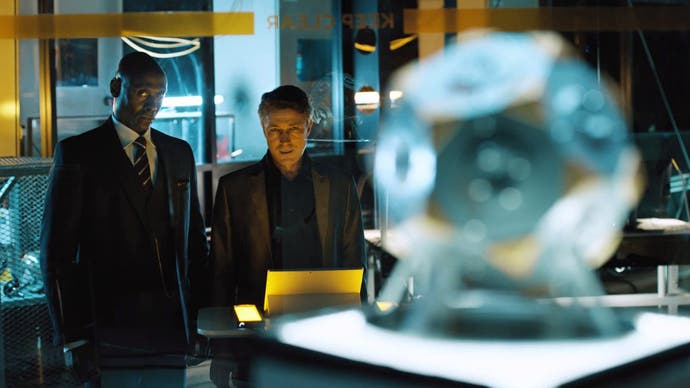
The clumsy platforming and environmental puzzles that provide extended changes of pace don't fare so well, lacking the grace found elsewhere - thick yellow generator cables are there to be followed until you find the requisite switch that opens a door, while your time powers are fleetingly called into play for clumsy interludes in which you beckon platforms into place. It's flimsy and awkward, with insta-kill moments in place of any mechanical elegance, though it does excuse some astounding set-pieces as you explore moments of instant violence frozen and flittering in on themselves.
An explosion in a university grounds, say, or a cruiser ship crashing noisily into a bridge; at these points there's a deliciously perverse fetishisation of twisting metal and shattered glass that would have done dear Ballard proud, and a phenomenal visualisation of it all, told in countless particles and streaks of expressive light. In these moments of stylistic muscle Quantum Break is at its absolute weakest as a game. Conversely, it's where it's at its strongest as a spectacle.
It's as a spectacle that Quantum Break really triumphs, a showcase of excellence on Remedy's behalf as it creates an experience that's aggressively handsome, delivered with great visual flair. When those firefights break out into noisy showers of sparks, pockets of fractured time and splinters of scenery, Quantum Break shows the magic that can happen when you give a handful of demoscene veterans a Hollywood budget.
Scratch away at that and you've got a watchable TV series wrapped around a focussed and competent game, but Remedy's keen sense of style manages to elevate Quantum Break to something just about worthwhile. Maybe it's because of how eccentric the whole enterprise is. There's never been anything like Quantum Break, and it's hard to imagine there ever being anything like it again: more often for better than for worse, Remedy's strange hybrid feels like an adventure out of its own time.
